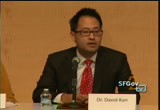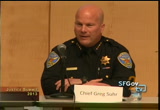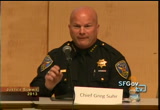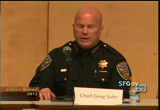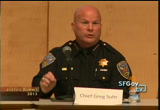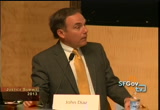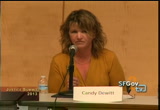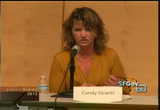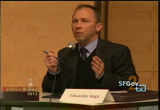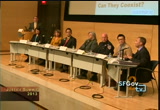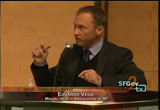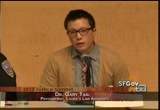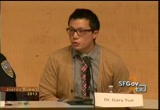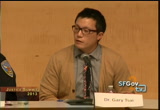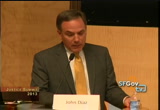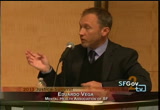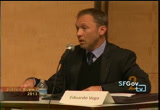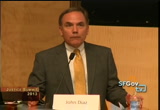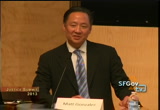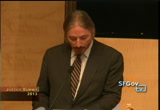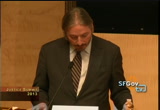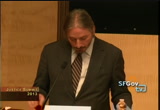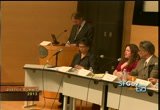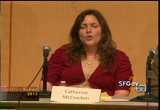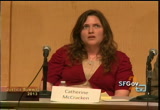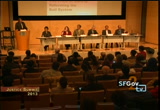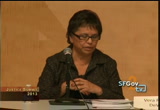tv [untitled] November 1, 2013 12:30am-1:01am PDT
12:30 am
month with $200 in your pocket and you are in tenderloin and the other extreme is the stationery outcome with handcuffs. so the illustration here is that somewhere between these two extremes, there is a level of treatment structure that is appropriate for the particular patient. when we think about the patients who end up in the revolving court's, they have trauma, bad thing that have happened to them and they have no support and they have gotten no lover to support them, no livelihood to live for. what you need to do is provide an adequate amount of support to help them achieve the goals they want. notice i didn't say sobriety.
12:31 am
12:32 am
have yet to have a patient walk through my door, and say i have need help. i have not have that happen before. i have seen thousands of patients. there are potential medications that may offer promise for managing. managing chronic alcoholism. i know the cities are pursuing some of the those medications. they are expensive but at the same time if i can offer someone an injection that perhaps may not be as drunk anymore, most people will think about giving it a try. there are various types of treatment protocols coming up and those show promises as well. in the end it has to do with time and effort. those are the thing that really there is nothing
12:33 am
new in addiction that is that magical that will change what i do >> thank you. [ applause ] >> last we want to hear from the police chief in san francisco. likely your officers end up in the front lines with these people who need services. what's working out there and what is not working and what tools you need to do the job? >> it's kind of ironic that we are going last because we are first in dealing with people with crisis and i can remember back when i was brand new back in 1981. there were folks in
12:34 am
alley ways, one comes to mind his name was bobby, you wouldn't even recognize him from the time you would initially contact him to the time he would get out after a 90 day hold for court. you don't have that anymore. the answer can't be to do nothing. so as police officers here in san francisco there is a myriad of options that officers go through whether it's 51/50 where people are danger to themselves or to others, door alleys, i know there are some mental health professionals who work closely with our program. we are trying not to get folks into custody. dr. mcglaegen,
12:35 am
when we like restaurants, it's no fun arresting a drunk. there is a huge range. but again, with the city of san francisco, you have to do something. when you have people that is certain unimaginable. they can't make the call. they would help themselves if they could but they can't. so in talking about the san diego sip program which i know our mayor is in favor of and we are going to try to do it in this city and we have talked to them about the work they do with dr. mcglaegen, if we can get it going and have
12:36 am
them stop this. if you can't, you get 30 days, but you have to pick it or it gets picked for you if you can't pick. on the high side, jail is not something we want to talk about for people in crisis, the poison doesn't go in their arm, the poison doesn't go in their mouth. they get clean clothes. yeah, we didn't have the programs and services we have now, you go see them when you are putting more serious criminals in jail for real criminal violations versus these are just holding periods to get the person a break if you will from harming
12:37 am
themselves to get to a point where they could select some of the options that are here up on the table. we are not talking about moss months and years. it takes literally an act of god to get a conservatorship on someone. it does not happen in san francisco. there are people in san francisco that desperately need to be in conservatorship. we don't do it here in san francisco, but we should. it's the kind and compassionate thing to do for some people that are at that state of crisis where they can harm themselves or someone else's. i don't think there is people in support of the death penalty, but that's the penalty you are sending these folks to. >> thank you. [ applause ] . the panelist have really
12:38 am
given us a terrific overview of different perspectives on this and we are going to get to audience questions in just a few minutes. go ahead and fill out your carts and we'll get to you momentarily. let me start by opening the discussion. i want to start with you kenny dwight and ask about something eduardo vega that said that force is not treatment. that basically the key is to approach people with mental illness with love, kindness and compassion. i know from our editorial page that when we have written about laura's law that some of the post poignant arguments from family members that they have done everything they can do but don't know how
12:39 am
to help a loved one. what would you have done? could force treatment made a difference? >> yes. absolutely. laura's law is not forced treatment. i don't know why mr. vega keeps using that word because laura's law is an upfront tool before somebody needs crisis. if they are proven to be a danger to themselves or someone else, a judge tries to get a treatment team and they try to talk with this person and figure out a way for them to stay out of the hospital. we have forced treatment, we have 51/50. my son has been through 51/50 numerous times. he's been
12:40 am
slammed with this. this is a horrible experience. laura's law is a tool, only a tool that may help. for whoever can help, and thank god they don't to have go through the other part. i would say the same thing as this officer said is that some people can't help themselves. the not civil to sit here and watch people lose their lives. i can tell you that. i have been in groups for 4-and-a-half years. i have heard many family members. their children are losing their lives, families are in severe stress. we have to find something else. not our 51/50, not our 52/50s. we are waiting for people in crisis before we do it.
12:41 am
thank you, eduardo i want to give you a chance to elaborate on it. we heard basically that one of the basic symptoms of a person with severe illness is that they can't recognize that they are mentally ill. how do you deal with that when you approach someone that they don't think they are sick? >> let me reframe it. what do you do about, if i asked you if you were mentally ill and you say no and that actually becomes a way of diagnosing you as mentally ill, doesn't that present a lot of problems? people, and that actually is one of the things that i think is most concerning. now, obviously there are people who are very ill and there is a lot
12:42 am
of debate about the terms that we use for psychiatric illness. now, if you tell me, edward, you have this diagnosis and if you don't believe you have that diagnose, it's reinforcing my belief that you have this diagnosis. that's problematic. but and you can see that really the issue, i think there is a reason this is interesting because it treks back to the real issue of mental health which is what was the responsibility of society to provide services and supports for psychiatric illness. we want to ask that question, with should ask what was the rate at which we fund services and supports for mental illness, what was the range of services we provide. the question about whether or not somebody agrees to your diagnosis and as a matter of course, your average person in the system for several times will receive 3,
12:43 am
4, 5 times different diagnosis. without getting technical, there are issues that are broader an that's what this panel is interested about. we have to ask ourselves do we believe as a society our role is to take people's choice and freedom away from them under certain circumstances and/or is our role as a society to support and provide what we can do the best. no solution. there is no perfect answer. we already have involuntary processes and we already have services. we can do a lot better, but the real question is to me is, more interaction around people's lives that revolves around authority taking control of their lives, is that really going to produce the results we want in this society? >> we are going to audience questions in a second. i want
12:44 am
to make sure that gary has a chance to answer as a psychiatrist. how do you deal when someone is asked are they mentally ill and they say know and that is used against them? >> yeah, i think, i want to start off by talking about why i'm interested in this issue. as i mentioned earlier, i have a family member. my mother has 60s schizophrenia since i was very young. we went through the same heart aches in terms of trying to get her into treatment and having her presented very well and having her discharged and police getting involved simply for being psychotic in a public area and going to court hearings. a very messy issue.
12:45 am
the reason why i'm interested in this particular issue is not because i'm interested in controversy or particularly polarizing issues, but because i believe in it. i believe that laura's law outpatient treatment is a tool among many tools that we have in the mental health system to try to engage people in a recovery based way. the foundation of laura's law is a multidisciplinary team trying to engage people, trying to give them as much say in the treatment plan as they are willing to provide and when you read the description in nevada county that has it fully implemented. when you meet the people who work they are, they believe in the same things that mr. vega was mentioning, love kindness, i think that's why we
12:46 am
all do this work but there are individuals like my mother, maybe like his son who need a little bit of extra help. i think that sometimes oftentimes clients see judges differently than they see their doctors. they are more line listening to judges than their doctors and than can be a very effective push into treatment, and that sometimes not pushing them in that way prevents them from getting into treatment in the beginning. what i found is that that is the first step to recovery. once they are in treatment, they continue to receive treatment voluntarily. but sometimes some individuals need a little bit of extra help. that's how i see -- actually one thing that, i think it's also important to distinguish between making
12:47 am
diagnosis, i think the diagnosis of schizophrenia or bypass bipolar is very clearly state. the fact that one has an illness or not is not in the criteria. >> we have an audience. >> thank you. [ applause ] >> we have an audience question for eduardo vega. for the severely mentally ill, involuntary measures and current use are chaotic and traumatic. we talked about the current system, on the other hand laura's law provides community service with know forced meds. why would you be
12:48 am
against it? >> why has laura's law be implemented in one small rural county. i think part of the answer is we do have good community services and support in san francisco and we have the best in the country and funded through the mental health services act. do they solve all the problems? absolutely not. do we need more? absolutely. to bring an additional court process that threatens people with enforcement measures and takes away right to self determination is at the core of this. the people that run the program in nevada county. the program that provisions the
12:49 am
services, that program is available to people voluntarily. that only 4 people have been treated through the voluntary clause. that service is available to all people. 4 people were involuntary mandated to those services. couple of them succeeded, a couple didn't. the point is that the county where you have a chief of police who meets with the judge, who meets with the department of mental health or the head of the department of mental health have breakfast in their local coffee place. that model can work in a small community where you are going to know the clients and know the people that come up. does it work in an urban setting when you have highly complex and structured system or interaction of systems between
12:50 am
police, between providers and things like that? we don't think so and that's part of the reason it hasn't been implemented. it's filled with all sorts of legal problems and coordination problems with bringing additional core systems into alignment, using hospitals as enforcement measures and things like that. so there are good treatments and there are good services out there. but we need more of them and we need better than we do have. i totally agree with that. >> this is obviously an extremely important discussion and one that i suspect is going to continue not only here in san francisco but throughout the state and nation and really please join me, unfortunately we have run out of time but i want to thank our panelist for laying out this issue as they did. thank you very much. [ applause ]
12:51 am
>> >> welcome back to the annual public defenders summit. for many years we talked about the bail reform and ways to release people from custody. right now it's the size of your wallet. it doesn't matter what the charges are, you can get out of jail if you can pay. in san francisco, now as we'll discuss this, we have most of the people who are in jail are because of pretrial detention. these are people who have not been charged with a crime, they
12:52 am
just don't have the money to post bail t moderate is chief attorney and michael gonzalez and look forward to this panel and their with wisdom. >> thank you, jeff. the reform and commercial bail system is one of the hottest topics. the institute of policies has called the bail system a failed policy that leads to excessive incarceration and mostly of pretrial detainees who cannot afford to buy their freedom. time and time again commercial bail has proven itself to most effective with those released
12:53 am
on assurity bonds with 60 percent less likely to become fugitives. let me introduce the panel, der a dwight is with the association, she owns carson bail bonds and in the industry for 4 decades and former mistake mayor of carson california and helen for the juvenile and criminal justice system and currently on the and ralph on the commission of san francisco and works closely with the sheriff's department which now leads the program for
12:54 am
violent offenders. >> san francisco, he has over 3 decades of experience in law enforcement including his former role as chief of police in san francisco. he's been a critic of current models in the criminal justice system that rely too heavily on incarceration. will looeng is the c e eo of diversion project from ranging from final alternatives to rehabilitative programs to more comprehensive case management and finally jonathan simon is adrian craig in professor of law, teaches courses on criminal laws, criminal justice, law and consulted culture and law risk and studies. his book includes parole and the social control
12:55 am
of the under class 1890-1990 how the war on crime transformed american democracy and created fear. welcome our panelist. [ applause ] >> i'm going to start with catherine mccrack in, the organization on juvenile and criminal justice has done extensive reach on the bail system and pretrial detention. is the system currently working would you say and what reforms would you support? >> thank you for having m e here today. the center for criminal justice has released a report last year that did examine the bail industry particularly around the lobbying effort. i want to talk a little bit about the criticisms of the commercial bail industry that has been
12:56 am
reoccurring over the years and these date back as far back as to the 1920s that the commercial bail doesn't just a minute, discriminate those who can't afford bail. counties are responsible for an increased number of level. we have to better utilize our jail space and those confined to jail are the ones is that need to be there. when they come, they have to release inmates and that's not a systemic way. some
12:57 am
counties release first ones in and out. the criticism about the bail industry that it doesn't really address -- well, it affects individuals who are not able to post bail, are not afforded the same due process as other individuals that can affect their experiences through their trials. so, for example, individuals who are unable to post jail or are in custody through the hearing trial process, are attending their hearings in their county issued blues, they are also potentially attending hearings in handcuffs and that's the perception they have on these individuals and additionally
12:58 am
the folks that are not able to post bail are affected through collateral consequences by being potentially unnecessarily detained if they do not pose a risk to public safety. they are affecting their ability to continue with their employment, education or family responsibilities. so the center on criminal justice would advocate for an increased use or implementation of pretrial services at the local level and some on this panel will speak with more detail on that. >> let me ask miss dewint that you are obviously part of the bail association and the president of the organization, you have decades of experience. critics have argued that your association and other associations like it use their influence by way of lobbying to
12:59 am
protect the groups financial interest. i'm wondering if you can respond to that and perhaps give us an idea what kind of lobbying your organization does? >> thank you. first of all let me thank jeff and the san francisco public defenders office for this 10th year of the justice submit summit. thank you and i don't have a prepared speech. i do want to address some of these misconceptions. there is a bail reform and we are part of the reform. we are proud to say that we are part of our regulatory agency with the department of insurance to reestablish the industry. but alongside of that we are not a one size fits all industry. there is a place for the
1:00 am
criminal justice system as well as the criminal bail industry. now we have testified along with catherine, our lobbying effort are basically this is what we look like. this is the lobbyist. we are not a high paid, i represent the mom and pop businesses throughout the state of california and certainly although hopefully our assurity companies employ their lobbyist. this is what it looks like. it not the chico's bail bonds. we are mom and pop and the majority of our agencies are owned by women. i'm eye i want to have the opportunity to say what we mean. legislator coming this year is what we are looking at at
54 Views
IN COLLECTIONS
SFGTV2: San Francisco Government Television Television Archive
Television Archive  Television Archive News Search Service
Television Archive News Search Service 
Uploaded by TV Archive on

 Live Music Archive
Live Music Archive Librivox Free Audio
Librivox Free Audio Metropolitan Museum
Metropolitan Museum Cleveland Museum of Art
Cleveland Museum of Art Internet Arcade
Internet Arcade Console Living Room
Console Living Room Books to Borrow
Books to Borrow Open Library
Open Library TV News
TV News Understanding 9/11
Understanding 9/11


